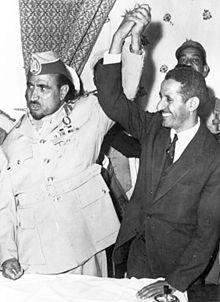Hamud al-Jaifi

Hamoud al-Jaifi ( Arabic حمود الجائفي, DMG Ḥamūd al-Ǧaifī ; * 1917 or 1918 in North Yemen ; † 1985 ), sometimes also transcribed as Djaifi , al-Jaifi , el-Jaefy , Gayefi or al-Jaifi , was a Yemeni general and politician. From 1964 to 1965 he was Prime Minister of the Yemeni Arab Republic (Northern Yemen).
Like Abdullah al-Sallal and Hassan al-Amri , Hamud al-Jaifi was one of the first group of Yemeni officers who had been trained at the Iraqi military academy in Baghdad in the 1930s on behalf of Imam (King) Yahya . He was arrested in 1948 for participating in an attempted coup after the murder of Yahya, but released again in 1955 during a renewed revolt in Sanaa. Until 1962 he was an instructor at the Yemeni military school in Sanaa. The young republican coup officers who overthrew the monarchy in September 1962 are said to have initially selected him as the face at the front, but al-Jaifi is said to have let al-Sallal go first.
Under al-Sallal, al-Jaifi was promoted to general and commander-in-chief of the army. As ambassador to the United Arab Republic (Egypt), in October 1962, he reached the Egyptian intervention in favor of the young Yemeni republic, which was in the civil war against the royalists supported by Saudi Arabia and Jordan and led by the overthrown imam. In place of Hassan al-Amris, al-Jaifi was appointed President of the Executive Council of the Republic (Prime Minister) on April 29, 1964, and al-Jaifi's government began work on May 4. Deputy Prime Minister was Abdul Rahman al-Iriani .
As head of government, Al-Jaifi was also a member of the United Political Leadership formed in July 1964 to prepare for the unification of Yemen with Egypt. During the civil war, like al-Amri, al-Iriani, Ahmad Muhammad Numan or other conservative republicans , he advocated reconciliation with moderate royalists, but in contrast to al-Amri and Co., he rejected a withdrawal of the Egyptians. In the course of the power struggles within the republican leadership, he was replaced by al-Amri on January 6, 1965, but remained chief of the army and was Minister of Economics in al-Amri's cabinet until July 1965. He played an important role in the defense of Sanaa during the 1967/68 siege and took his leave after the end of the war in 1970.
literature
- Gustav Fochler-Hauke : Der Fischer Weltalmanach 1965 , page 86. Frankfurt am Main 1964
- Lothar Rathmann : History of the Arabs - from the beginnings to the present , Volume 3 (The Arab liberation movement in the fight against imperialist colonial rule 1917-1945), page 223. Akademie-Verlag, Berlin 1974
- Dr. Werner Rosenberg : Die Welt - data, facts, information of the year 1964 , page 374–378. Dietz Verlag Berlin 1965
- Robin Leonard Bidwell : Dictionary of Modern Arab History , 209. Routledge, New York 2010
Web link
- Hamoud al-Jaifi , Internationales Biographisches Archiv 32/1964 of July 27, 1964, in the Munzinger Archive ( beginning of article freely accessible)
| personal data | |
|---|---|
| SURNAME | Jaifi, Hamud al- |
| ALTERNATIVE NAMES | Jaifi, Hamoud el- |
| BRIEF DESCRIPTION | Yemeni officer and politician |
| DATE OF BIRTH | 1917 or 1918 |
| PLACE OF BIRTH | North Yemen |
| DATE OF DEATH | 1985 |
| Place of death | Sanaa |